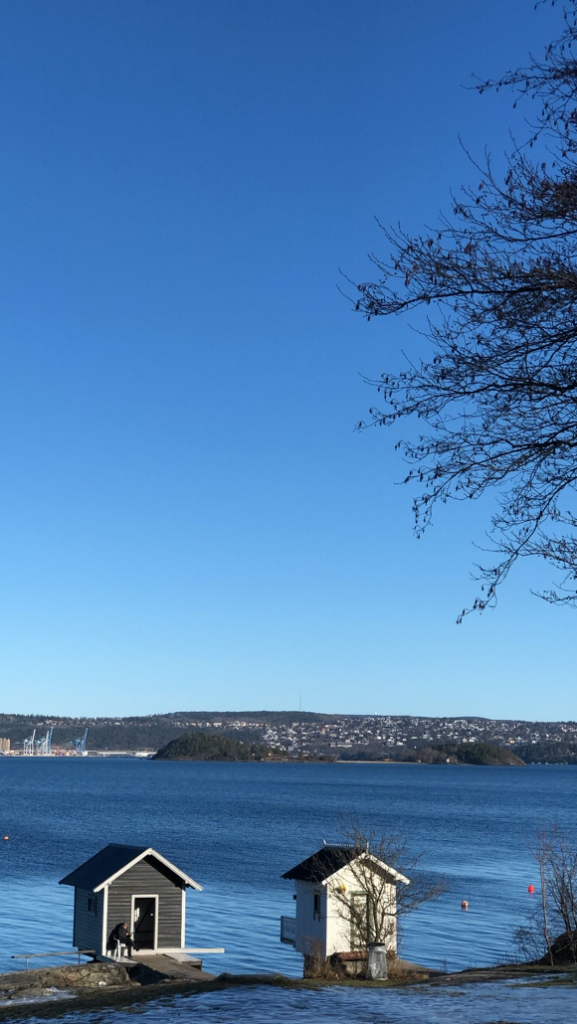Overview
- Duration: winter semester 2021/22 and summer semester 2022
- Host Country: Norway
- Host University: UNIVERSITY OF OSLO (UIO)
- Department of ERASMUS Cooperation: Fachbereich Neuere Philologien
- Course of Studies: Linguistik
- Date: July 07, 2022
 |
 |
1. Preparation before the stay abroad
I started my Erasmus year despite the Corona-Pandemic, even if especially in the planning
period before my stay abroad it was still unclear what the future holds.
However, I was able to live out my year abroad at the University of Oslo very well despite in
times of the Corona-Pandemic or other conditions. In this testimonial, I would like to go into
more detail about my experiences, which could also be helpful for Erasmus follow-up students.
The application for my year abroad in Oslo for the University of Oslo had to be done quite
quickly, because you must stick to fixed deadlines. A letter of motivation + CV was required,
which had to be sent to the Global Office of the Goethe University Frankfurt. In addition, one
had to register in the Mobility Online Account at www.service4mobility.com to be able to control
the entire application process. During the waiting process, it was also possible to familiarize
oneself with the Mobility Online Account, since the direct exchange with the contact persons of
the Study Abroad team takes place in the software and any further steps, e.g., documents that
needed to be uploaded, were structured, and described in detail in the participant account. After
about two months I was nominated / accepted for my Erasmus stay abroad. This was followed
by a conversation with my contact person, which was very helpful. The conversation served as
an opportunity to ask questions about the planning of the stay abroad, such as the financing
and scholarship opportunities or the processing of the learning agreement, course requirements
and accommodation options.
For the Learning Agreement you can search for the courses you want to take on the University
of Oslo website (https://www.uio.no/english/studies/courses/) and you should discuss them with
your contact person for confirmation and agreement. This is done before you send the
completed Learning Agreement and have it signed by the ‘Responsible person at the Sending
Institution’ (Goethe University Frankfurt) and the ‘Responsible person at the Receiving
Institution’ (University of Oslo) (https://learning-agreement.eu).
1.1. Financial costs
Regarding scholarship opportunities, I was sent a mobility grant of 450 € (monthly) from DAAD
(German Academic Exchange Service) for my Erasmus+ study abroad. In addition, if you would
like to apply for a foreign student grant (Auslandsbafög), you should apply for it half a year in
advance. In Oslo, payment is mainly made by card and very rarely with cash, so you should
have a debit card or, if necessary, a credit card with you. If you study in Oslo for a whole year,
the University of Oslo also offers to open a bank account in the host country, but in my opinion,
this is not necessary. (See here: https://www.uio.no/english/studies/internationalstudents/
before-arrival/bank-services/index.html) I would like to add, that you should plan
around 1000-1500 € per month including rental costs. If you plan a few trips, you should plan a
little more money. It is no secret that in Scandinavian countries, especially for exchange
students or tourists the living costs can be very expensive. However, Oslo is a city with a large
student population and therefore there are also many opportunities to save through discounts
(e.g., student bars, cafes, attractions, restaurants, public transportation, etc.).
1.2. Housing
Lastly, when planning your stay in advance, I would like to emphasize the importance of finding
accommodation. The best option is to apply for a student residence through SIO Housing
(https://www.sio.no/en/), but you should also stick to the deadlines because the earlier the better
since the processing period also takes some time. I personally got my acceptance for the Sogn
student residence two months before my departure and could therefore book my flight ticket
around that time. The cost of the rent was about 500 € for a furnished room with shared kitchen
and bathroom, a total of 6 roommates.
In addition, there is the possibility on Facebook groups or Finn.no (https://www.finn.no) to look
around for private apartments, but you must pay a lot more than for student residences and
there are additional rental costs.
2. During the stay abroad at the host university
During the first weeks of my stay in Oslo, I was able to settle into the dormitory and my
surroundings. Afterwards, the students of the University of Oslo organized the so-called Buddy-
Week of the respective department, where all exchange students are allowed to participate and
are divided into different groups. During this week there is the possibility to get to know other
exchange students through different get-to-know games. Additionally, there are sightseeing
tours, student parties/events and other activities.
The Buddy-Week was for me personally a highlight of my stay, because I was able to get to
meet different exchange students from all over the world, many of whom had the same course
of study as I did, and you also get a lot of insider tips about the student life in Norway from the
organizers.
A week before the start of lectures, a welcome zoom meeting was held by the international
coordinator for exchange students of the Faculty of Humanities. In this meeting any questions
about enrollment, registration for courses, registration with the police and other topics were
discussed, which was very helpful. Enrollment is done through Studentweb as well as course
registration (https://studentweb.uio.no/studentweb/login.jsf?inst=FSPROD). You also have a
free choice of courses and the possibility to participate in different Norwegian courses for
exchange students, which was also very beneficial, and I personally enjoyed it very much as a
linguistics student (https://www.uio.no/english/studies/courses/norwegian-language/).
I did the police registration before I went abroad, because appointments are always booked out
very quickly and therefore the waiting time can be longer.
(https://www.uio.no/english/studies/international-students/police-registration.html).
Another advantage that was mentioned in the meeting is that you have the possibility to choose
or change courses 3-4 weeks after arriving in the host country. This was very helpful because
you get a better insight into the required courses on site at the university through converations
with professors and other students.
2.1. Studying at the University of Oslo
I studied at the Faculty of Humanities at the University of Oslo. The university was about 10-
15 minutes by public transport from the Sogn student resisdence, which was very convenient.
You could take the bus, walk, or take the T-Bane to Blindern Station. At the campus University
of Oslo at Blindern there are several lecture buildings, cafeterias, a gym (Athletica Blindern), a
restaurant, a supermarket (Bunnpris), a great number of many study rooms, general sitting
facilities for reading or studying and large libraries (https://www.ub.uio.no/english/libraries/).
Especially during exam periods, it can get quite crowded on campus and therefore there is also
the possibility to study at the Sogn dormitory in the ‘Yellow House’ or at various public libraries
in the Sentrum. My personal favorites were the Deichman Bjørvika or the Nasjonalbiblioteket.
3. Personal Conclusion
Finally, I would very much like to describe my personal conclusion.
A personal highlight for me was my one-week trip to Tromsø with my roommates. It was an
incredible experience to watch the Northern Lights and a great opportunity to get to know my
roommates better. In general, Oslo is the perfect place to study and relax, especially as a nature
person, as there are many beautiful lakes and parks that you can reach on foot, public transport
or even by ferry (Sognsvann lake, Frogner Park, Bygdøy, Huk Beach, Aker Brygge).
I wanted to make this experience for myself alone and of course there was also the fear of
moving to a foreign country for a whole year because you are not yet exactly aware of what to
expect (regarding the Corona pandemic and the stay abroad in general). But every moment has
been so worthwhile and rewarding. Whether bad or good moments, you can learn so much
about yourself, your environment, different cultures and people.